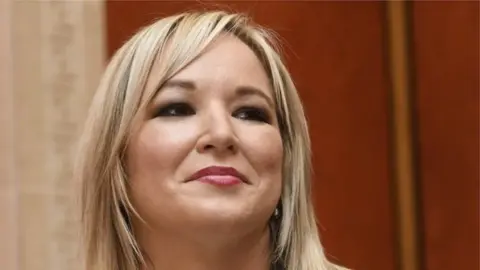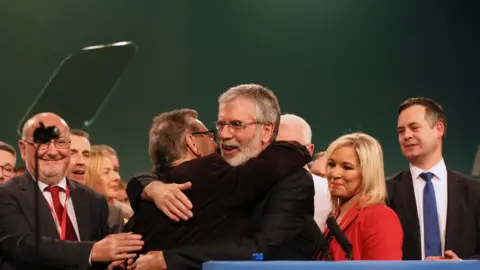Michelle O'Neill rules herself out as Sinn Féin leader
 Pacemaker
PacemakerSinn Féin's Stormont leader Michelle O'Neill has ruled herself out of replacing Gerry Adams as party leader.
Mrs O'Neill told BBC's Sunday Politics programme that she had "enough to do" in her current role.
Mr Adams announced at Sinn Féin's ard fhéis (party conference) on Saturday that he would stand down as the party's leader next year.
"Leadership means knowing when it's time for change and that time is now," said the 69-year-old.
Mr Adams has been party president since 1983, but told the conference it would be his last as leader.

Analysis: BBC NI political editor Mark Devenport
Sinn Féin may hope that Mr Adams' decision not to stand in the next Irish election will make any talks about a future coalition in Dublin more straightforward.
But Fianna Fáil Leader Micheal Martin has repeated his view that Sinn Fein remains unacceptable as a partner in government.
Whatever the future brings, there's no doubt Gerry Adams' move marks an historic change as a leader who oversaw the republican movement's journey between violence and peace gives way to another politician who will pursue Irish unity through more conventional parliamentary politics.

Sinn Féin deputy leader Mary Lou McDonald is the front-runner to replace him.
It is expected that a special party conference will be held next year to elect a new president.
Mrs O'Neill was appointed Sinn Féin's Stormont leader in January, after former deputy first minister Martin McGuinness retired.
She said she would not be entering the Sinn Féin leadership race and would be concentrating on dealing "with the problems in the north".
She added that it was an "emotional, but also an exciting, time for republican politics".
"We will see who puts their name forward and then I will obviously make my decision on who I'd support that time."
She added that the election of a new president will be a "very health process".
'Hamster wheel' talks
Meanwhile, Mrs O'Neill has called on both government to take a bigger role in breaking the ongoing political deadlock in Northern Ireland.
 Getty/AFP
Getty/AFPThe power-sharing government at Stormont collapsed in January and several rounds of talks to restore the institutions between Sinn Féin and the Democratic Unionist Party (DUP) have failed.
Mrs O'Neill said that she was sure the parties would return to a "talks process of some description but it has to be meaningful - we can't keep going around the hamster wheel".
She added that she will tell Prime Minister Theresa May when they meet on Tuesday that the Conservative Party have not sufficiently encouraged the DUP to strike a deal because of their Westminster pact.
On Saturday, she called on the Irish government to appoint a minister with responsibility for advancing Irish unity.
At Sinn Féin's party conference, she said that a parliamentary committee in the Republic of Ireland should also be formed to look at a united Ireland.
On Saturday, delegates at the ard fhéis voted to liberalise the party's policy on abortion.
Party members voted in favour of allowing abortions where a pregnancy poses a risk to a woman's health, including mental health.
There will be a referendum on abortion law in the Republic of Ireland next May or June.
Sinn Féin's previous position supported allowing terminations when a baby is expected to die in the womb or shortly after birth, and in cases of rape or incest.
Currently, the law in the Republic of Ireland only permits abortion when there is a real and substantial risk to a woman's life. In Northern Ireland, terminations are only legal when continuing with a pregnancy poses a serious or permanent risk to a woman's health.